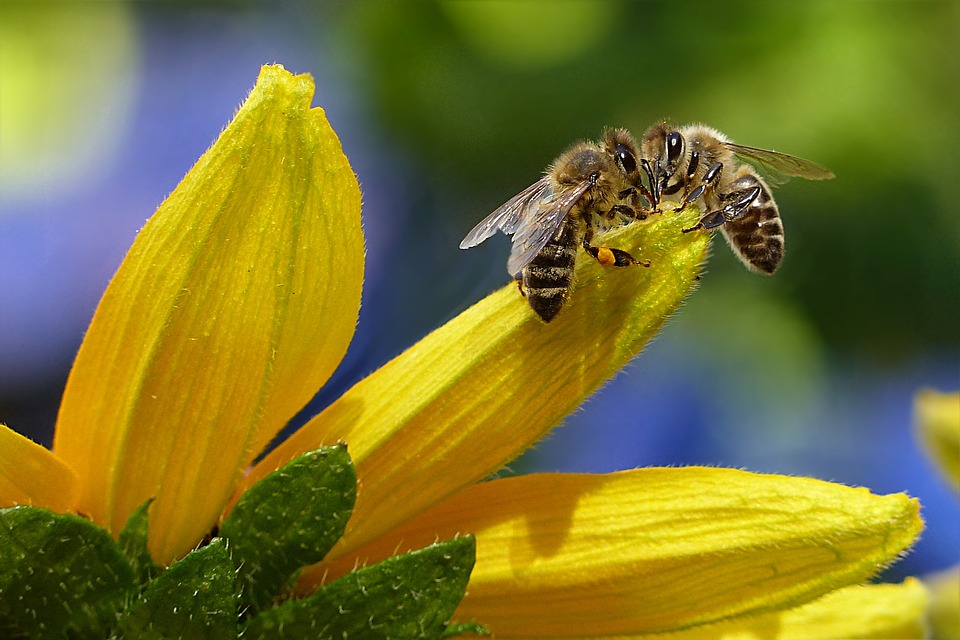Spring Guest Post by Christy Erickson

Note: Thank you, again to Christy – during this season of the Dandelion, she has offered a special piece on remembering early spring foraging foods for the bees in our landscapes.
How You Can Be A Bee-Friendly Gardener
It’s never too soon to start planning your garden for next spring. You want the best for your little patch of earth, but are you considering all living things in your domain? How about bees? You’ve tried their honey and possibly used their wax, but did you know just how essential they are for your garden? Here is some advice to bolster your relationship with these busy little pollinators, and how you can make sure it’s more than just a peaceful coexistence.
The Benefit of Bees
You are probably aware that bees are pollinators, meaning that they carry pollen from plant to plant, allowing them to flower and reproduce. This is important because without bees, plants would not be able to readily reproduce, especially with the kind of diversity they gain from pollination.
These plants are more than just pretty flowers and blades of grass. They account for over 85% of foods that humans consume, and that’s not even counting the foods livestock consumes. To sum it up, bees are a big deal when it comes to our environment, and we owe a lot of the food we eat to the work of bees. So how can you help?
The Problem With Herbicides
Most gardeners are aware of the importance of bees to the success of their garden and have no problem letting them pollinate their plants and flowers throughout the spring season. However, some gardeners are still unintentionally harming the native bees in their garden and possibly putting their garden, and the environment, at risk.
Right now, you might be using pre-emergent herbicides to keep the seeds of unwanted weeds from growing in your garden. However, some of these weeds are actually essential to the survival of bees. Plants such as dandelions are usually early bloomers once spring rolls around. To many gardeners, these plants are pesky weeds that need to be dealt with quickly to save their lawn and garden. However, plants such as dandelions are key early forage foods that provide pollen for bees.
While you may not care whether your dandelions are pollinated, bees still need them for food. Ridding your garden of these early forage foods could put your garden’s bee population in peril, and that could spell bad news for your garden down the road. Remember: herbicides, especially pre-emergent herbicides, are used to prevent seeds from growing. When preparing your garden for spring, you might just want to avoid using these dangerous chemicals all together.
Practicing Good Bee Etiquette
Bees often get a bad rap because when people come into close proximity to bees, they can lash out violently and sting them. As you share your garden with these little creatures, it’s important to respect their space and exist peacefully alongside them. When bees first leave the nest, they often swarm, which can be strange to witness. Hundreds of honey bees will latch onto a plant, or the ground and swarm around each other. If you see this happening, don’t freak out. Keep your distance, and they will soon disperse and go about their work.
Keeping your distance is probably the soundest advice for maintaining a peaceful coexistence with your garden’s bees. They will mind their own business and will gladly work around you if you work around them. Keeping your distance is especially important if you happen to have any allergies toward bees, and you might want to wear long sleeves and gardening gloves in case you unintentionally get too close to these little helpers.
Bees work hard to keep their queen happy and their colony thriving. This hard work pays huge dividends for your own garden, so why not give them your full support? As you prepare for next spring’s garden, be sure to keep the bees in mind.
Photo Credit: Pixabay
In addition to Christy’s information, I thought I would include a few links to some pollinator friendly products and information for you and your garden:
Pollinator seed mix from High Country Gardens – This company out of New Mexico specializes in drought resistant and native plants and seeds for the Rocky Mountain region and beyond. This particular mix features several medicinal species such as California Poppy and Echinacea, in addition to beautiful ornamental pollinator attracting plants.
100 Plants to Feed the Bees – Storey Publishing – An easy to follow format with beautiful full color photos, geared toward small to large spaces.
What to do if you see a swarm, and you don’t have a hive for them – contact the Swarm Hotline – The Colorado Beekeepers Association will arrange for a beekeeper to safely collect the swarm to re-home.
